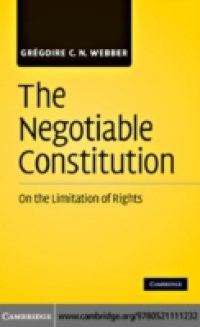In matters of rights, constitutions tend to avoid settling controversies. With few exceptions, rights are formulated in open-ended language, seeking consensus on an abstraction without purporting to resolve the many moral-political questions implicated by rights. The resulting view has been that rights extend everywhere but are everywhere infringed by legislation seeking to resolve the very moral-political questions the constitution seeks to avoid. The Negotiable Constitution challenges this view. Arguing that underspecified rights call for greater specification, Gregoire C. N. Webber draws on limitation clauses common to most bills of rights to develop a new understanding of the relationship between rights and legislation. The legislature is situated as a key constitutional actor tasked with completing the specification of constitutional rights. In turn, because the constitutional project is incomplete with regards to rights, it is open to being re-negotiated by legislation struggling with the very moral-political questions left underdetermined at the constitutional level.

